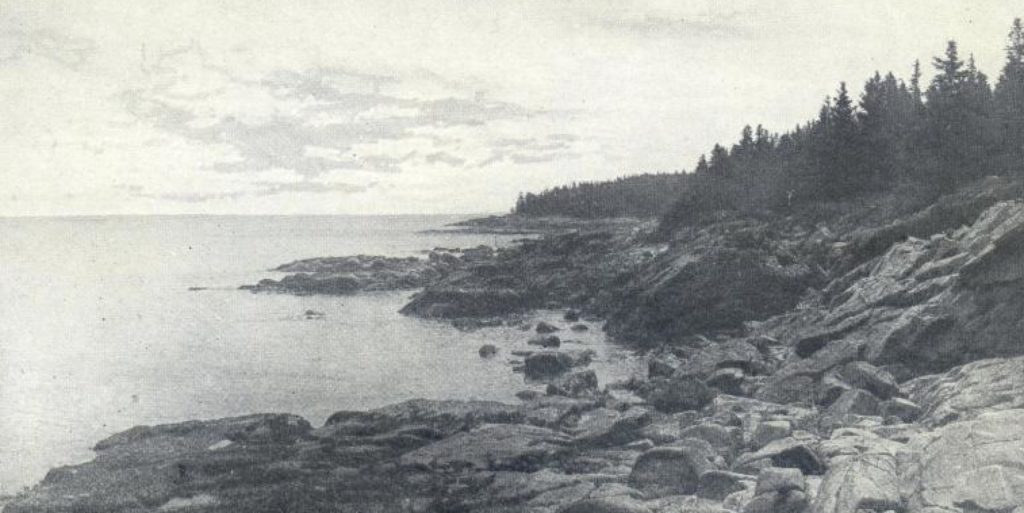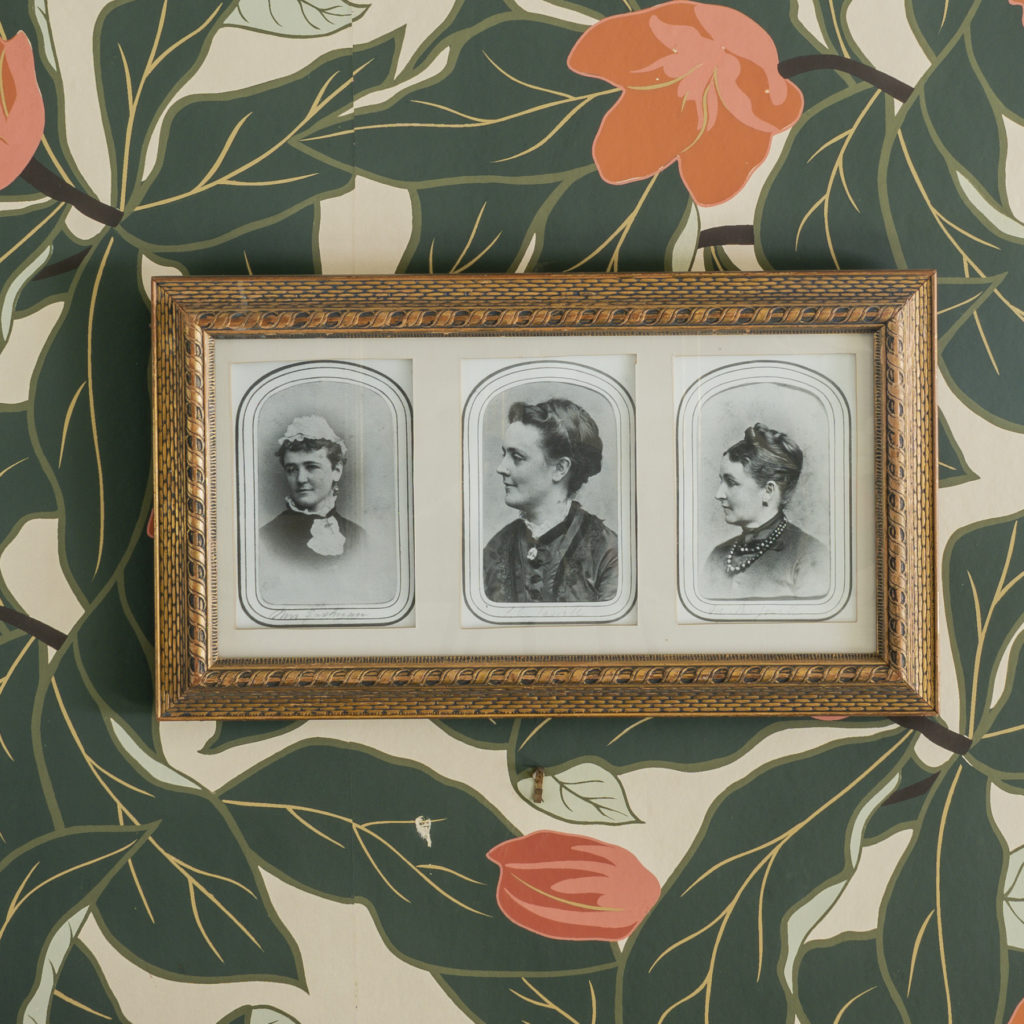 Sarah Orne Jewett House
Sarah Orne Jewett House
Second Floor Hall
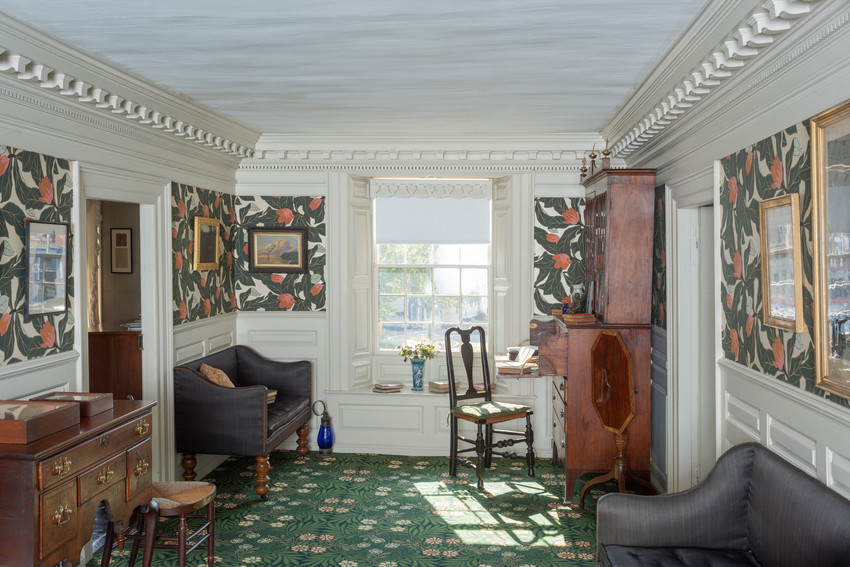
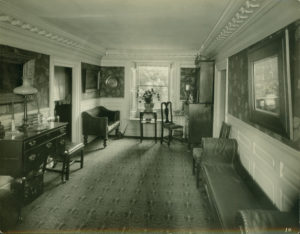 The second-floor hallway houses Sarah Orne Jewett’s writing desk, where she would have penned most of her works written after 1887, including The Country of the Pointed Firs.
The second-floor hallway houses Sarah Orne Jewett’s writing desk, where she would have penned most of her works written after 1887, including The Country of the Pointed Firs.
The desk belonged to Sarah’s grandfather, Captain Theodore F. Jewett, and is placed by the southern window looking out onto South Berwick center. Grandfather Jewett may have chosen the spot for its vantage point of his mercantile store across the street; for Sarah Orne Jewett, the view of townspeople coming and going on ordinary errands likely inspired her deft characterizations and human nature-revealing stories.
Grandfather's Desk
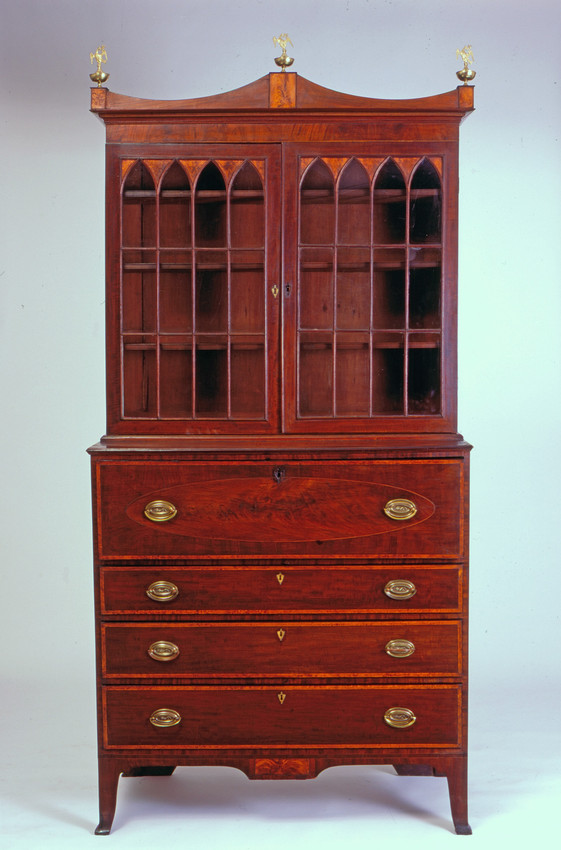 Aside from its importance as the desk at which Sarah Orne Jewett wrote her stories and novels, this is a particularly well-documented piece of furniture. When the bookcase is removed, the top of the lower case reveals a branded maker’s mark: “JOSEPH MURPHY.” Murphy was a local cabinetmaker whose account book survives at the Portsmouth Athenaeum. In June 1829, he charged Jewett’s grandfather $60 for this “Large mahogany secretary.” The accounts suggest that in addition to building furniture, Murphy may also have built Jewett’s store in 1817, a few doors down from his own shop. Many years later, Sarah’s sister Mary recalled that Murphy “…was a cabinet maker of much skill, to which many pieces of old furniture to be found in our houses can attest…”
Aside from its importance as the desk at which Sarah Orne Jewett wrote her stories and novels, this is a particularly well-documented piece of furniture. When the bookcase is removed, the top of the lower case reveals a branded maker’s mark: “JOSEPH MURPHY.” Murphy was a local cabinetmaker whose account book survives at the Portsmouth Athenaeum. In June 1829, he charged Jewett’s grandfather $60 for this “Large mahogany secretary.” The accounts suggest that in addition to building furniture, Murphy may also have built Jewett’s store in 1817, a few doors down from his own shop. Many years later, Sarah’s sister Mary recalled that Murphy “…was a cabinet maker of much skill, to which many pieces of old furniture to be found in our houses can attest…”
Sarah's Desk
A Place to Write
“Miss Jewett’s ‘den’ is the most delightful I have ever seen. It is in the upper hall, with a wide window looking down on the tree-shaded village street. A desk strewn with papers is on one side and on the other a case of books and a table. Pictures, flowers and books are everywhere.”
Sarah Orne Jewett (interview, Philadelphia Press, 1895) Colby College Special Collections, Waterville, Maine
Click on the spots to discover some of Jewett’s personal and published writings, as well as an inspirational quote from the nineteenth century French novelist Gustave Flaubert that she kept close by.
[no date]
My dear Miss Putnam,
This is the first pen, and it is all you said it was! I have learned long ago that some pens have a motive power of their own, and some have to be driven wearily along the page -- But oh! what a dear and charming box you put them in with an S.O.J. that can never sleave any doubt of the proud and happy owner. I love to have associations with the things I keep on my desk -- all my little tools! and this will often and often remind me of you with such a happy thought of your remembrance….
Yours sincerely
Sarah O. Jewett
Sarah Orne Jewett (Letter to Georgina Lowell Putnam, niece of James Russell Lowell, on receipt of a gift pen). Mss SL 262 (1-4), Spence and Lowell Family Papers, The Huntington Library, San Marino, CA
From “The Flight of Betsey Lane”
“Miss Peggy Bond was a very small, belligerent-looking person, who wore a huge pair of steel-bowed spectacles, holding her sharp chin well up in air, as if to supplement an inadequate nose. She was more than half blind, but the spectacles seemed to face upward instead of square ahead, as if their wearer were always on the sharp lookout for birds.
Sarah Orne Jewett (“The Flight of Betsey Lane, collected in A Native of Winby, 1893)
“…but the discovery was soon made that Mrs. Todd was an ardent lover of herbs, both wild and tame, and the sea-breezes blew into the low end-window of the house laden with not only sweet-brier and sweet-mary, but balm and sage and borage and mint, wormwood and southernwood. If Mrs. Todd had occasion to step into the far corner of her herb plot, she trod heavily upon thyme, and made its fragrant presence known with all the rest. Being a very large person, her full skirts brushed and bent almost every slender stalk that her feet missed. You could always tell when she was stepping about there, even when you were half awake in the morning, and learned to know, in the course of a few weeks' experience, in exactly which corner of the garden she might be.”
- Sarah Orne Jewett (II. “Mrs. Todd,” The Country of the Pointed Firs)
Dear love I am so often sending you messages -- and I hope the 'little white mother' don't forget them by the way -- Are you sure you know how much I love you? If you don’t, I can't tell you! but I think of you and think of you and I am always being reminded of you.
I am yours most lovingly -- S. O. J
- Sarah Orne Jewett (Letter to Annie Fields, March 1882), MS Am 1743 (255), Houghton Library, Harvard University
"Écrire la vie ordinaire comme on écrit l'histoire.”
--Gustav Flaubert (In English, “Write ordinary life as we write history.” Sarah Orne Jewett kept the quotation on her writing desk)
Letter to Annie, “The Dulham Ladies” (talks about writing)
Tuesday evening
24 November 1885
Dear Fuff
I am so glad to have you home again. Yes, you did leave your little book here and I did not suppose you would want it until I came, so it was not sent. I daresay I should have forgotten it, too, but I will not now. What a dismal day! but it is almost the first very bad one. It has snowed a little here and been chilly and dark, and I have felt a little stiff and found it hard to shake off my cold, though it is a good deal better.)
I have been busy putting “The Dulham Ladies” in order, but I really am afraid it is not the thing for the Atlantic. There are funny places in it, and yet with all the good bits it does not make a good whole thing -- I will bring it up and let the Linnet see it, because I promised, but it will do better for the Independent and I shall say so frankly -- I can give him “The Gray Man. ”
-- All these last stories lack something. I want to say "Well what of it?" when I finish reading them -- I am ashamed to say that I think I shall get on better another year for why didn't I get on well this year except that last winter's siege took the goodness out of it --
…I wish I could sleep through Thanksgiving Day! but I am going to try to be good -- Good night from tired and bad Pinny but one that loves you.)
Sarah Orne Jewett (Letter to Annie Fields, November 24, 1885) MS Am 1743 (255), Houghton Library, Harvard University. MS Am 1743 (255). Transcription by Terry Heller, Coe College.
The little English sparrows flit in the lilac bush outside;
I like to watch the busy things. There's one that's tried and tried
To break a string the children tied around a branch one day;
How hard he pulls it with his beak! Now he has flown away.
- Sarah Orne Jewett (“Waiting,” Our Continent, April 26, 1882)
to learn more
Sisters
Sisters
They were called “the doctor’s girls,” in their town of South Berwick. Caroline “Carrie” Jewett (left, and below center), Sarah Orne Jewett (center and below left), and Mary Rice Jewett (right and below right), grew up to be affluent and educated in the well-respected Jewett household. Mary was two years older than Sarah, and Sarah six years older than Carrie.
As adults, Sarah and Mary had a closeness that stemmed from Mary’s running of the Jewett household so that Sarah could spend her time writing. In turn, Mary and Carrie were often together at the family compound in Sarah’s absence. When Sarah was away, the sisters exchanged letters, sharing concern for each other and happy news, gentle, nudging humor and family expressions, travel stories and town talk; what emerges is a sisterhood that is also friendship between all three of these “doctor’s girls.”
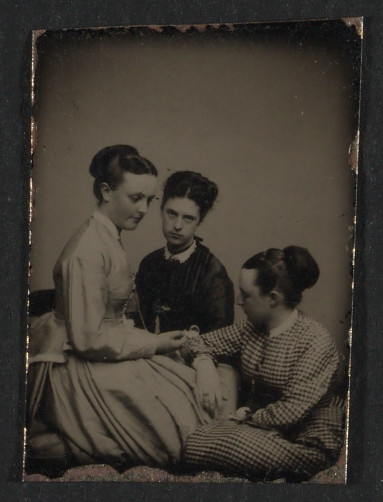
Tiny Treasures
Display Case
Two tabletop cases in the second-floor hallway display small items owned by Sarah or her sister Mary. At least some of these were probably kept as mementos of Sarah by her sister Mary and nephew Teddy.
Wallet
This wallet belonged to Sarah’s grandmother Sarah Orne Jewett (1798-1820), for whom she was named. The wallet contains both hair of the younger Sarah, and hair of one of her grandfather’s sisters.
Trinket Box
This brass trinket box is Japanese, with a bird, frog, spray, and basket design. Inside the box are four thimbles. A thimble, commonplace in the nineteenth century, is a small metal cup placed on the fingertip to prevent the wearer from being pricked when sewing.
In her youth, Sarah mentioned sewing in her diary; in one instance, she writes about sister Mary bringing home blue silk from which Sarah would make a dress. Later, Jewett had local dressmaker Olive Grant create garments for her. Still, loose buttons and hems would call for hand sewing repairs.
Spoon
Brass spoon with Arabic lettering and a turquoise stone on the terminal
Miniature portrait Samuel Jewett
The subject of this miniature portrait is Sarah’s uncle, Captain Samuel Jewett. Samuel Jewett died at the age of twenty-three on the maiden voyage of The Berwick, a ship owned by his father, Sarah’s grandfather. Samuel Jewett died three years before Sarah was born.
to learn more
Display Case
In this display case, a card backing two brooches contains handwritten notes by Sarah’s nephew Theodore describing their ownership and use.
Brooches with note
Under the silver bead brooch, Sarah’s nephew Teddy (Theodore Jewett Eastman) has written, “M.R.J. wore this almost daily since I can remember/T.J.E.”
Between the two brooches, Teddy has written about the buttons, upper right, “The old silver buttons were S.O.J.’s, then worn by M.R.J.”
Under the gold leaf brooch, Sarah’s nephew Theodore Jewett Eastman has written, “S.O.J.’s and then M.R.J.’s and worn by both a great deal.”
Perfume vial
This glass and silver perfume vial belonged to Sarah Orne Jewett, and later to her sister, Mary Rice Jewett. After Sarah’s death, Mary may have kept the vial as a token of remembrance.
Buttons
These Italian silver buttons, each with a daisy motif, date to the late nineteenth century. The buttons were first worn by Sarah Orne Jewett, and later her sister Mary. In an era when women’s clothes were more often constructed than purchased, buttons from a dress no longer wanted would be taken off and reused on a new dress.
Box
This Italian box, made of paper, is inscribed by Theodore Jewett Eastman and may have been a gift to his aunt Mary Rice Jewett.
to learn more
